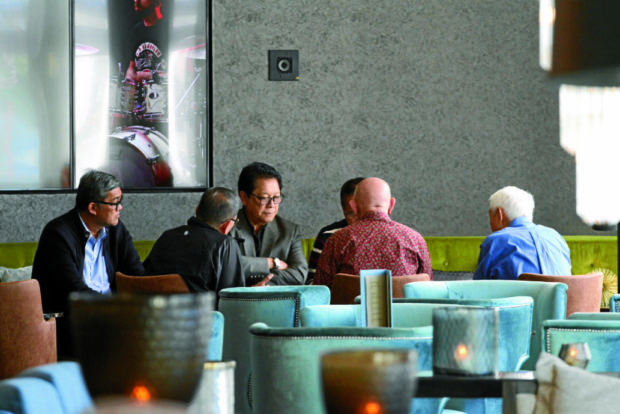Gov’t to pursue peace talks despite boycotting 5th round

INFORMAL MEET Peace negotiators from the government huddle with those of the National Democratic Front of the Philippines to discuss ways of saving the fifth round of talks hours before formally announcing their withdrawal. —KARLOS MANLUPIG
NOORDWIJK AAN ZEE, The Netherlands – The Philippine government on Sunday formally called off the latest round of peace talks with the National Democratic Front of the Philippines (NDFP), political arm of the Communist Party of the Philippines (CPP), after they failed to resolve a dispute over a CPP order for its fighters to step up attacks on government forces.
But no one’s packing up yet. Both parties were to meet again informally on Monday to find mutually acceptable solutions for the negotiations to move forward.
Presidential Adviser on the Peace Process Jesus Dureza said the withdrawal from this round of talks was not a formal withdrawal from the peace process initiated in August 2016.
“The peace talks have not been canceled and the peace process remains intact,” said Elisabeth Slattum, special envoy of Norway, which has been facilitating the peace talks.
Because of the unresolved dispute over the CPP order to its fighters, Dureza announced in a late night press conference President Duterte’s latest directive—“not to participate” in the latest round of talks.
Fifth round
“There are no compelling reasons for us to change the decision … which we announced yesterday,” Dureza said, adding that the government was “formally” withdrawing from the round.
It was the fifth scheduled round of talks since the resumption of formal negotiations between the government and the communist rebels in August last year and meant to address such issues as a joint interim ceasefire, social and economic reforms and human rights issues.
The breakdown of the talks, held at this scenic Dutch seaside resort, came as fighting flared on Sunday between government forces and the Maute group in Marawi City, with the death toll nearing 100 after almost a week of fighting.
Mr. Duterte declared martial law on May 23 in Mindanao to quell what he called a fast-growing threat from terrorists linked to the Islamic State group.
The CPP later directed its armed wing, the New People’s Army (NPA), to intensify offensives against government forces implementing martial law.
Talks stalled on Saturday when Dureza objected to the CPP telling NPA guerrillas to intensify attacks in response to Mr. Duterte’s declaration of martial law.
Conducive environment
On Sunday, Dureza said the talks would not resume until there were indications of an “environment conducive to achieving just and sustainable peace.”
Asked whether this included the CPP order to escalate attacks, he said: “It is a factor.”
NDFP senior adviser Luis Jalandoni explained that the CPP directive to step up NPA attacks was not intended to undermine the negotiations.
Jalandoni said it was a response to the statement of Defense Secretary Delfin Lorenzana that the NPA was among the targets of martial law.
Reconsider CPP order
The government peace panel chair, Labor Secretary Silvestre Bello III, has clarified that the NPA is not a target.
Jose Maria Sison, NDFP chief political consultant, responded by disclosing that the peace panel had already recommended to the CPP to reconsider its directive to the NPA.
But the NDFP explained that it would take some time to communicate and fully implement the new directive because of the guerrilla character of its forces on the ground.
Sison added that the communist movement was one with the government in opposing and fighting terror groups that posed a threat to civilians and communities.
The snag in the talks doused the already warm mood on Sunday morning during the informal meeting and Mass, which was attended by both parties.
From Saturday afternoon to Sunday, both parties rushed to explore all possible solutions to resolve the problem.
Duterte call
Optimism was high after the parties met in a small group back-channel meeting on Sunday morning, which was followed by information that the fifth round of talks might commence in the afternoon.
But after Mr. Duterte’s call to Dureza, the government decided to call off the latest round of negotiations.
NDFP chief negotiator Fidel Agcaoili said the decision of the government would delay the reforms that both parties were pushing for. “This setback will definitely be a big one in terms of hastening the forging of agreements on social and economic reforms,” he said.
Despite the nonparticipation of the government, both parties continued to express their commitment to pursue the peace process.
“What is clear is that we are withdrawing from the fifth round but we are not terminating the talks,” Bello said.
Slattum said that it was normal for peace processes to have difficulties.
“Norway has worked for a long time on a range of peace processes around the world and it is our experience that what defines a successful peace process is not the absence of crises but the ability of the parties to overcome them and push through,” she said.
“Norway is very hopeful that the parties will be able to return to the negotiating table very soon,” Slattum said. —WITH A REPORT FROM AFP